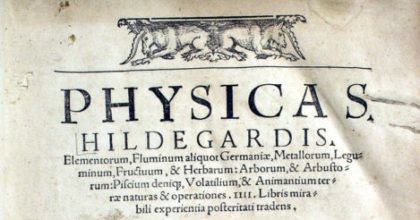
 )
)Happy New Year! As folks transition back to campus and work and other normal routines from the holidays, I thought it would be a good time to take stock and lay out a plan for the coming months of science blog posts. There will still be posts about new developments in science, particularly as they pertain to faith questions or religious concerns. As I mentioned last week, we’ll try another round of the blog book club; I’m hoping to start that on February 7th. I also want to try some new kinds of posts as I continue to figure out the best balance of news coverage and bigger picture discussions.
Why cover science at all? On one level, that’s an easy question for me. I’m a scientist, and a big reason I became I scientist is because I’m endlessly fascinated by the subject. I enjoy reading about science, I enjoy talking about science, I enjoy writing about science. Most days, I don’t need much more of a ‘why’ than that. But we’re not all wired the same, and even the most die-hard enthusiasts need a reminder now and again of what motivated them. Plus it’s good to have a deeper sense of purpose beyond personal satisfaction. So when it was recently brought to my attention that some readers might appreciate a better sense of why science is relevant to their faith, or why their faith is relevant to science, I thought it was a good time to reflect on those questions.
I wrote a single post on the theology of science previously. But that was a few personal thoughts, not a comprehensive treatment. I think there’s room to elaborate further, and I think it would be good to have some help. So, for our next blog book club we’re going to pick a book to give us a more thorough overview of the theological basis of science. I have a couple of ideas, but so far I haven’t hit upon an obvious choice; if you know of a book I’m overlooking, please let me know in the comments. I’m hoping to get away from natural theology, which I see as more about what studying science can teach us about God, and focus more on how theology provides a basis for doing science.
Relatedly, I think it would be good to profile some of the notable Christians who have studied science in the past, and/or notable scientists who were Christians. I’m not in a position to provide extensive biographies, but I think we can get some valuable insights just from seeing the broad range of contributions Christians have made to science and getting a flavor for the different perspectives that led them into the sciences. Plus the history of science is a good avenue for understanding what motivates the study of science.
At this point, I’m not planning a formal series of posts, beyond the format of the blog book club. Instead, I expect these threads of theology and historical profiles to weave in among posts about current science and other usual topics. I’m also hoping to cover some more sci-fi this year after 2017 was a little bit disappointing on that front. So you can look forward to all of that in the coming year.
As a teaser for these new threads, let me call your attention to Hildegard of Bingen. I first encountered Hildegard working in a classical music store, where she is one of the earliest composers whose music is still performed and recorded. She also made significant contributions to science and medicine of her era. As we’ve discussed before, the Middle Ages were not as dark when it came to science as is popularly implied, and Catholic scholars like Hildegard preserved and elaborated on classical natural philosophy. She had experience as a healer, and championed a holistic approach to keeping both mind and body healthy that in some ways modern medicine is only now coming back around to. Her theology strongly informed her studies and writing on health, citing the fall as the ultimate source of all disease and treating healing as a way to restore creation to its intended order.
Know of a Christian in the sciences you’d like me to highlight? Have the perfect book for covering the theology of science? Tell me about them in the comments!
Andy has worn many hats in his life. He knows this is a dreadfully clichéd notion, but since it is also literally true he uses it anyway. Among his current metaphorical hats: husband of one wife, father of two teenagers, reader of science fiction and science fact, enthusiast of contemporary symphonic music, and chief science officer. Previous metaphorical hats include: comp bio postdoc, molecular biology grad student, InterVarsity chapter president (that one came with a literal hat), music store clerk, house painter, and mosquito trapper. Among his more unique literal hats: British bobby, captain’s hats (of varying levels of authenticity) of several specific vessels, a deerstalker from 221B Baker St, and a railroad engineer’s cap. His monthly Science in Review is drawn from his weekly Science Corner posts — Wednesdays, 8am (Eastern) on the Emerging Scholars Network Blog. His book Faith across the Multiverse is available from Hendrickson.

Andy,
Thank you for a good start to the calendar year. Looking forward to more in this area.
You and your readers may already have seen this article, but it bears on your discussion, albeit from a more general approach: http://www.christianitytoday.com/ct/2017/december/clergy-behind-science-as-we-know-it.html?share=yFeqJK9W9AnrdkdhrwkZ7jbx90%2bMggxF
Cheers!